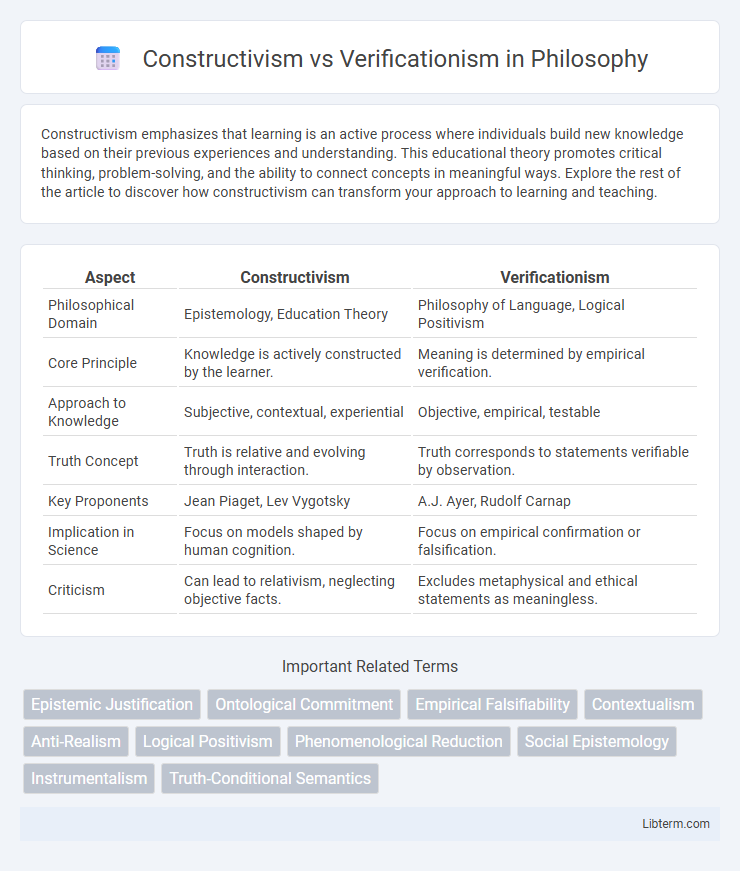Constructivism emphasizes that learning is an active process where individuals build new knowledge based on their previous experiences and understanding. This educational theory promotes critical thinking, problem-solving, and the ability to connect concepts in meaningful ways. Explore the rest of the article to discover how constructivism can transform your approach to learning and teaching.
Table of Comparison
| Aspect | Constructivism | Verificationism |
|---|---|---|
| Philosophical Domain | Epistemology, Education Theory | Philosophy of Language, Logical Positivism |
| Core Principle | Knowledge is actively constructed by the learner. | Meaning is determined by empirical verification. |
| Approach to Knowledge | Subjective, contextual, experiential | Objective, empirical, testable |
| Truth Concept | Truth is relative and evolving through interaction. | Truth corresponds to statements verifiable by observation. |
| Key Proponents | Jean Piaget, Lev Vygotsky | A.J. Ayer, Rudolf Carnap |
| Implication in Science | Focus on models shaped by human cognition. | Focus on empirical confirmation or falsification. |
| Criticism | Can lead to relativism, neglecting objective facts. | Excludes metaphysical and ethical statements as meaningless. |
Introduction to Constructivism and Verificationism
Constructivism posits that knowledge is actively constructed by individuals through experience and interaction, emphasizing cognitive development and context in learning processes. Verificationism, rooted in logical positivism, asserts that a statement or theory is only meaningful if it can be empirically verified or is tautological, prioritizing observable and testable evidence. These epistemological frameworks contrast in their approach to truth, with constructivism valuing subjective interpretation and verificationism demanding objective validation.
Historical Background of Both Philosophies
Constructivism emerged in the early 20th century, influenced by mathematicians like L.E.J. Brouwer who challenged classical logic and emphasized the mental construction of knowledge, contrasting with traditional objective realism. Verificationism, strongly associated with the Vienna Circle in the 1920s and 1930s, was grounded in logical positivism and held that a proposition is meaningful only if it can be empirically verified or is a tautology. Both philosophies arose as responses to questions about the nature of knowledge and meaning, shaping debates in epistemology and the philosophy of science during the 20th century.
Core Principles of Constructivism
Constructivism centers on the idea that knowledge is actively constructed by learners through experience and reflection, emphasizing subjective understanding and the social context of learning. It asserts that reality is interpreted differently by individuals based on their prior knowledge and interactions, rejecting the notion of objective truth found in verificationism. Core principles include the importance of scaffolding, learner-centered environments, and the integration of new information with existing cognitive structures.
Fundamental Tenets of Verificationism
Verificationism asserts that a statement is meaningful only if it can be empirically verified or is tautological, emphasizing the primacy of sensory experience and logical analysis in determining truth. It rejects metaphysical claims as cognitively meaningless due to their lack of empirical verification, grounding knowledge in observable, testable phenomena. This fundamental tenet prioritizes verification criteria to demarcate scientific statements from non-scientific or meaningless assertions.
Key Differences Between Constructivism and Verificationism
Constructivism emphasizes knowledge as actively constructed by learners through cognitive processes, prioritizing subjective experience and context in understanding reality. Verificationism asserts that meaningful statements must be empirically verifiable, focusing on observable data and logical analysis to validate knowledge claims. The key difference lies in constructivism's acceptance of multiple, context-dependent truths versus verificationism's insistence on objective, empirically testable assertions.
Philosophical Implications and Debates
Constructivism posits that knowledge is actively constructed by individuals through experience and social interactions, challenging the objective truth claims emphasized by verificationism, which demands empirical validation as the criterion for meaningful statements. Philosophical debates arise over constructivism's relativism versus verificationism's commitment to scientific rigor and falsifiability, questioning the nature of truth, reality, and the limits of human understanding. This tension influences epistemology by contrasting subjective knowledge creation with objective knowledge verification, shaping discussions on the foundations of knowledge and meaning in philosophy of science.
Impact on Scientific Methodology
Constructivism emphasizes the role of social processes and human cognition in the development of scientific knowledge, influencing methodologies to incorporate interpretive and qualitative approaches. Verificationism prioritizes empirical verification and logical analysis, shaping scientific methods around hypothesis testing and observable data. The impact on scientific methodology is a shift between subjective, consensus-based validation in constructivism and objective, evidence-based validation in verificationism.
Applications in Modern Epistemology
Constructivism in modern epistemology emphasizes the active role of the knower in shaping knowledge through social and cognitive processes, influencing fields such as education, psychology, and science studies. Verificationism, rooted in logical positivism, restricts meaningful statements to those verifiable through empirical observation or logical proof, impacting the development of analytic philosophy and scientific methodology. Contemporary epistemologists apply constructivist principles to address the contextual and interpretative nature of knowledge, while verificationist frameworks continue to inform criteria for empirical validation and theory confirmation.
Criticisms and Limitations of Each Approach
Constructivism faces criticism for its potential relativism, which can undermine objective knowledge by emphasizing subjective experience and social context over empirical validation. Verificationism is limited by its strict criterion of meaning, which excludes metaphysical, ethical, and aesthetic statements from meaningful discourse, thereby narrowing the scope of philosophical inquiry. Both approaches struggle to address the full complexity of knowledge, with constructivism criticized for lack of falsifiability and verificationism for its overly restrictive empirical focus.
Conclusion: Relevance in Contemporary Thought
Constructivism emphasizes the active role of human cognition in shaping knowledge, making it highly relevant to contemporary educational theories and social sciences that prioritize context and meaning. Verificationism, rooted in logical positivism, focuses on empirical verification as the criterion for meaningful statements, influencing scientific methodology and analytic philosophy. Contemporary thought often integrates constructivist perspectives to address the limitations of strict verificationism, promoting a more nuanced understanding of knowledge validation and truth.
Constructivism Infographic

 libterm.com
libterm.com